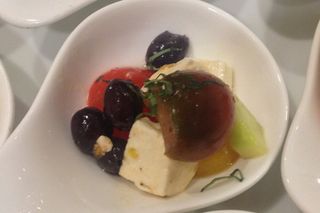
Tomatoes, Summer's Last Sigh (Op-Ed)

Katherine Tallmadge, M.A.,R.D., is a registered dietitian, author of "Diet Simple: 195 Mental Tricks, Substitutions, Habits & Inspirations" (LifeLine Press, 2011) and a frequent national commentator on nutrition topics. This article is adapted from one that first appeared on the Georgetown Dish. Tallmadge contributed this article to LiveScience's Expert Voices: Op-Ed & Insights.
Don't say goodbye to summer yet. There is still plenty of summer's most lovely seasonal produce, particularly heirloom tomatoes — my favorite — to entertain with.
I recently created a presentation for the hotel's health club members called Four Steps For Strengthening Muscles — Some Surprising News. For the presentation, hotel executive chef Douglas Anderson uniquely and beautifully interpreted Greek salad with heirloom tomatoes (see recipe below) and other recipes from my book Diet Simple.

Every vegetable in the recipe — the tomatoes, cucumbers, peppers, sweet onions and garlic — can be found at local farmers markets. The possibilities are endless. This is a naturally vegetarian recipe, but for the meat lovers, it's great with grilled chicken or seafood on the side.
Tomatoes are one of the "superfoods " in nature. In a recent study, men who consumed 10 or more servings of tomato products a week had a 35-percent decrease in risk of prostate cancer relative to those who consumed 1.5 servings or fewer per week. That outcome is largely attributed to lycopene in the tomatoes, which is also in other red fruits such as watermelon, pink grapefruit and guava.
In a separate study, men with lycopene levels in the top 20 percenthad a 46-percent decrease in risk of heart attack compared to those in the bottom 20 percent.
Lycopene is a potent scavenger of gene-damaging free radicals. But don't expect to get it from a supplement. You must eat the tomato as you need the whole food to receive the benefits!
Sign up for the Live Science daily newsletter now
Get the world’s most fascinating discoveries delivered straight to your inbox.
Many studies have shown that lycopene-rich foods reduce the risk of prostate cancer, but the mechanism behind the reduction was not well understood until now. A recent study found that lycopene has a substantial protective effect against prostate cancer by interfering with the genes that would allow the prostate cancer cells to grow and survive. The American Institute for Cancer Research recommends that men take advantage of lycopene's cancer-preventing effects and fill tehir diets with foods such as tomatoes, watermelon and guava.
Greek Salad with Heirloom Tomatoes as interpreted by Four Seasons Hotel Executive Chef Douglas Anderson
Greek Salad with Heirloom Tomatoes From Diet Simple Farm to Table Recipes: 50 New Reasons to Cook in Season!
8 servings

Ingredients:
Vinaigrette: 2 Tablespoons Freshly Harvested Extra Virgin Olive Oil 2 Tablespoons Freshly Squeezed Lemon Juice (1 Lemon) 1 Tablespoon Chopped Fresh Oregano or Basil (or 1 tsp dried) 1 Clove Garlic, Minced (optional) Salt and Pepper to Taste (Salt is not necessary with the cheese and olives)
Vegetables: 2 cucumbers, peeled, seeded and sliced into a half-moon shape 1 onion, peeled and chopped coarsely 1 medium yellow, purple or green bell pepper, cored, seeded, chopped into large bite-size pieces 1 cup pitted Kalamata or other Greek Olives 4 Heirloom Tomatoes, quartered, and cut into large, bite-size pieces
4 ounces Feta or Goat Cheese, broken into small bits
Instructions:
Combine the vinaigrette ingredients in a large salad bowl and whisk until blended. Add the cucumbers, onion, pepper, and olives and toss into vinaigrette. Let sit for twenty minutes to marinate. Add the heirloom tomatoes and cheese when ready to serve.
Tallmadge's most recent Op-Ed was "What — and When — to Eat to Build Muscle"and her additional contributions are available on her profile page. Her latest book is "Diet Simple Farm to Table Recipes: 50 New Reasons to Cook In Season." You can follow Tallmadge on Facebook, Twitter @KETallmadgeand on YouTube. The views expressed are those of the author and do not necessarily reflect the views of the publisher. This article was originally published on LiveScience.












